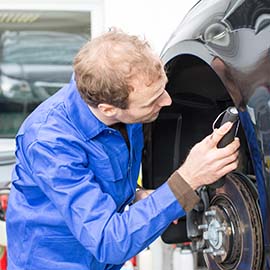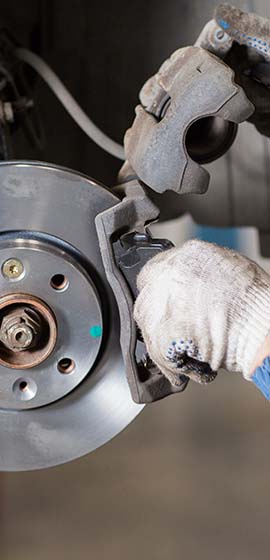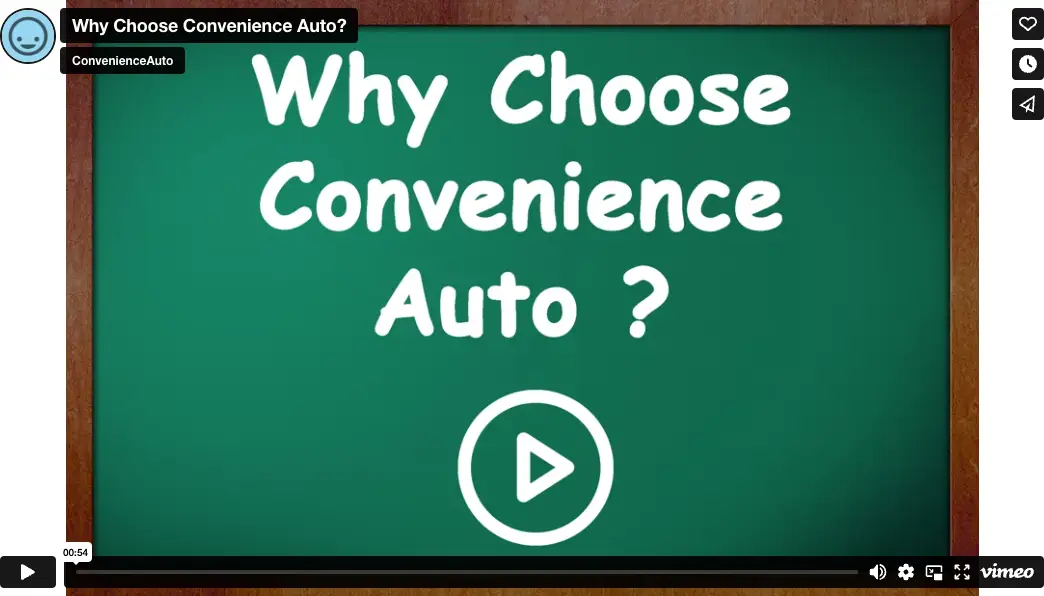Our work is backed by a 3-year, 36,000-mile warranty. Click here to see our warranty details.
Why Choose US For Your Next Brake Service ?
We offer the absolute best brake warranty in town.
Brake pads and rotors make up the major components of any comprehensive brake service. We will discuss these components, why they are important, and what to consider when thinking about brake service.
We think that once you understand what is important, you will recognize that our process offers you the best auto repair value in Washtenaw county.
Schedule Your Next Auto Repair Appointment
Let's get your vehicle running right.
Liberty St: (734) 769-0170
Jewett Ave: (734) 769-0380
Liberty St: (734) 769-0170
Jewett Ave: (734) 769-0380
Brake Service and Repair
“Modern” automotive braking systems haven’t really changed that much in the last 25 years or so. Car braking systems are so safe and reliable these days, it’s easy to overlook them. The average person presses their brake pedal dozens of times each day, so it’s easy to take them for granted. But remember, Brakes are probably the most important safety system on your vehicle. If you want to keep yourself and your family safe, maintenance of your brakes and attention to what your brakes might be telling you is important. If your car or truck exhibits any of these symptoms, stop in for a visit. We can help you sort out any issues, and determine if they are significant or not.
- Squealing or grinding noise when the brakes are applied.
- Many vehicles have built-in ‘noisemakers’ to alert you when brake pads are almost worn out. Worn out brake pads will also make this sort of noise. It’s a good idea to stop in anytime your brakes are making an unusual sound.
- The brake pedal vibrates when pressed.
- This is normally caused by a rotor that is no longer truly flat. This is a normal failure mode for a brake rotor. Feeling the pulsation in the steering wheel is normally an indication that the front rotor(s) are causing the problem, if you feel it through the seat, it’s likely coming from the rear. Minor pulsations are typically more of a nuisance than a safety issue, significant pulsations can cause loss of braking effectiveness. Have one of our technicians make a thorough check and provide a recommendation.
- Car veers or pulls to one side when the brakes are applied.
- Normally caused by a brake on one side of the vehicle stopping harder than the other side, or one side not working at all. This is potentially very dangerous. Stop in and see us right away.
- The car suddenly isn’t stopping as quickly as it normally does.
- This can be caused by many different failure modes and is potentially dangerous. Bring the vehicle in as soon as possible for an inspection.
- The RED Brake Failure light is on.
- This is normally caused by a hydraulic system leak and can be the precursor to a total brake failure. Avoid driving and bring the vehicle in for an inspection.
- The ABS (Anti Lock Brake) warning light is one, but the Red Brake Failure light is not.
- This is normally caused by a failure of ABS brake electronics or sensors. Some manufacturers will also disable other systems (such as speed control) until you get this fixed. This situation normally indicates that you have lost your ABS feature, but that base braking function is still OK. As with all brake anomalies, Call us for a brake check as soon as possible.
For the safety and well-being of yourself and your family, don’t fool around with brakes.
What You Should Know About Brakes
The national chain repair shops often advertise a fixed, low price to fix your brakes or a “lifetime” warranty on brake pads. The truth is, we don’t know how anyone can do this without having a close look at your vehicle. If the ad sounds too good to be true….
Our service advisors might be the only ones in town who are not on commission, so they are never incentivized to sell you anything you do not need or want. They work for you!
At Convenience Auto, we provide the best brake value in town and the best warranty. Some shops advertise this, so ask them… Do you warranty the pads and rotors for 3 years or 36,000 miles? We do!
At Convenience Auto, this is what the best brake service value in town means:
1.Complete brake inspection – Brake Pads, Rotors, Calipers, Slides, and other moving parts are inspected to determine what needs attention and what can wait. We also inspect your antilock brake hardware and sensors to make sure that the brake subsystem is working as it should. We will also measure the moisture and contaminant content of your brake fluid, and recommend replacement if appropriate.
2 We develop a Comprehensive estimate including top quality parts and labor. Everything you need to do the job right and give you peace of mind with the best warranty in town.
- We present our results to you with a “Not to exceed” price quote (parts and labor) along with our findings and recommendations. You decide how to proceed. We quote you the price based on a firm knowledge of your car and what it needs to be safe and reliable.
- The Brake system is reassembled with the new parts. Those components that might not need replacement (calipers, hubs, etc.) are cleaned and lubricated so that the work to manufacturer spec.) We also burnish rust from the wheel hub and apply a protective coating to both the hub and the wheel inner to make sure it can be removed easily. This will prevent potential issues the next time you have a flat tire!. Most shops don’t take the extra time or cost, but WE do because you are important to us.
- We ‘bleed’ the system to eliminate any air in the brake hydraulics.
- Wheel lugs are torqued to manufacturer specifications and in the proper order. This prevents future issues such as rotor warp down the road.
- Every vehicle receives a road test to ensure that the vehicle stops correctly and that you will be 100% satisfied when you pick up your vehicle.
At Convenience Auto, we keep car repair Simple and Convenient (and give you the best warranty in town).
The components that make up a modern disc brake system
Brake pads and rotors make up the major components of any comprehensive brake service. We will discuss these components, why they are important, and what to consider when thinking about brake service.
Brake Pads
Brake pads sound cushy - however, they’re anything but soft and snuggly. These components attach to the brake calipers in order to stop the discs (also known as rotors). The calipers squeeze the pads against the discs that are mounted next to the tires, which brings the whole operation to a halt when you press the brake pedal. Picture a spinning dinner plate – it’s the shape of a brake rotor. Now stop the plate from spinning with your thumb and forefinger – those are your ‘pads.’
The squeezing action eventually causes the brake pads to wear down. Brake pads will typically need replacing every 25,000-40,000 miles, depending upon the usage, how you drive, and the type of pads. Your brake pads need to be replaced when you hear the telltale squeal or squeak indicating the friction of metal-on-metal or one of the other symptoms discussed in the article above. Many modern cars also have wear sensors, which will light a lamp on the dash to alert you when you have less than 10% brake pad thickness left. Note: If your car has an electronic brake pad warning, the sensors must also be replaced when you get new pads. This will add to the cost of the overall brake repair. Your service advisor will let you know if they are needed or not.
There are three different kinds of brake pads and each has its own strengths and weaknesses.
- Organic: These brake pads were developed when health concerns arose surrounding asbestos - the original disc brake pad material. Organic pads are made of a composite of varying materials that may include rubber, glass, carbon, fiber, and more. They’re affordable and quiet, but don’t last as long as other types.
- Semi-metallic: These are made up of iron, copper, steel, or other metal, combined with fillers and a graphite lubricant. Semi-metallic brake pads perform better than organic and do a good job drawing heat away from the discs. They are, however, more expensive, and noisier than organic brake pads.
- Ceramic: The newest of the players in the brake pad field, coming onto the scene in the 1980s, ceramic brake pads are made of hardened ceramic material that’s combined with copper fibers. Ceramic lasts the longest and is quiet. However, ceramic pads don’t perform as well as semi-metallic in cold climates. Ceramic brake pads are also are the priciest.
Things to keep in mind to make sure you’re getting high-quality brake pads:
- Consider aftermarket: This is one of the parts for which an actual OEM part may not trump the aftermarket in quality. Many cars come off the line with organic pads which are the lowest performers and least enduring. There are a wide variety of quality brands and types to choose from. As you can imagine, this leads to a variation in pricing – a slightly more expensive pad often provides significantly more life, hence a better value. Be sure to ask, and know what is included when you request a brake service.
- Go with a trusted component: Brakes are one of those systems in your car that you want to make absolutely sure of getting genuine, high-quality replacements. We only use premium quality parts that offer good performance and the absolute best warranty.
- Check the warranty: Convenience Auto has a great warranty on their brake service. We offer a 3 Year, 36,000-mile warranty on not just the pads, but on the entire repair. Some of the major chains advertise a ‘lifetime’ warranty on brake pads. Read the fine print – their ‘lifetime’ warranty doesn't include any of the other parts that constitute the repair – rotors, sensors, and the labor generally are not covered. We use high-quality parts – they may not be the absolute cheapest, but the components we use offer you a higher level of value and lower cost of ownership. It’s how we do business.
- Certification: Look for D3EA (Differential Effectiveness Analysis) and BEEP (Brake Effectiveness Evaluation Procedures) certifications. These assure you that the brake pads meet certain minimum standards.
Brake Rotors
New rotors, or turn the old ones?
When it comes to rotors, you have two choices, Turn your old rotors on a lathe to get them smooth AND flat again, or purchase new rotors and simply replace the old ones. We recommend new rotors for about 90% of the brake services we perform. The cost is about the same in both cases. Turning the rotors involves more labor – Before we use old rotors, we remove them from the vehicle and turn them on a lathe that is specifically designed for this purpose. Purchasing a brand new rotor eliminates this extra labor, and the result is a brand new part. For most vehicles, this is the best value. If you have a large pickup or SUV, the economics tilt more toward using your old rotors. Rotors also wear, and sometimes get too thin to turn and use, and depends on your individual situation. Ask us if you would like to know more.
We use OE or premium quality aftermarket rotors
- Choosing the proper new brake rotor is determined by the vehicle you drive and how you drive it. The majority of vehicles produced will have solid vented rotors. However, some high-performance vehicles like BMW, Mercedes-Benz, and Audi are built with slotted or cross-drilled rotors, which are also vented. OE-equivalent rotors are fine for 95% of consumers and offer an excellent tradeoff between performance and price. If you were happy with your stock rotor's performance and stopping power, then direct OE replacements such as those would be a good choice, and what we normally recommend.
- The most common upgrade is replacing your solid rotors with either slotted or drilled rotors.
- Under high heat and heavy stopping conditions, the rotor actually gets so hot that when the brake pads and rotors make initial contact, the pads release exhaust gases from road grime, water, and overheating. The small air bubbles that form between the pad and rotor sometimes contribute to a spongy pedal feel. The slotting or drilling of brake rotors gives those gases a quiet way to escape; thus allowing the pad to make quick contact with the rotor and provide a stiffer and more precise pedal feel. Ask us if you would like to try upgraded rotors.
Why We use premium quality OEM components
Our warranty is an exceptional 3 years or 36,000 miles. Our experience, based on thousands of brake services, has taught us that unless you are planning to sell your car right away, taking the quality approach with brakes provides the lowest cost of ownership. Using high carbon, new steel makes the rotor last longer and stay flat longer. There are lower quality grades of rotor available, but we’ve found that they either wear (get too thin to work properly) or they warp and cause pulsations in the brake pedal or brake squeal. As car OEM’s have found, NO brake rotor technology can completely eliminate all of these issues, but using high-quality components will minimize the impact for many years. When contemplating a brake service, take the time to understand what components are included – a selection of brake rotors can easily add (or save between $50 to $100 to a brake service)
- For vehicles with aggressive cast wheels, if available, we would normally use a painted, or ‘Black Hat’ rotor. The reason for the paint is strictly cosmetic. The portion of the rotor that comes in contact with your brake pad is high carbon steel and will rust over time. This is normal and unavoidable. However, having the inner portion of the rotor painted (normally black) enhances the curb appeal. If’ you have paid a premium to have a stylish cast wheel, on your car, you don’t want to look at a rusty brake rotor underneath. This is a detail that is often overlooked when pricing a brake service, or when a shop is trying to offer the absolute cheapest price. We have had many customers (who got their brakes done elsewhere) lament how the look of their rusty rotor hubs deteriorates the overall great look of their wheels and tires.
- Other simple things like cleaning the rust off your wheel hubs after the wheel and tire are removed is something that adds a little bit of labor and time to a brake service, but we think it's important. Making sure that the wheel hub is free of rust and debris will make it easier to remove the wheel the next time you have to take it off. We also normally clean both faces of the hub and spray it with a corrosion inhibitor. It’s a small thing, but if you have to change that tire, (or the brake rotor) at midnight at the side a major freeway you will appreciate this extra effort.
- If your vehicle is over 10 years old, it is likely due for a brake fluid change. Brake fluid deteriorates over time just like engine oil. It might make sense to perform this service at the same time you service your brakes. Your service advisor can help you decide when / if this is appropriate. There are objective tests (such as moisture content measurement) that can make the decision much more objective than just looking at the color of the fluid. Ask us, and we will be glad to go over it with you. We will offer a further discussion of brake fluid and contaminants as part of another service offered at Convenience Auto – brake fluid service.
Why Choose Us for Auto Repair in Ann Arbor
Convenience. Peace of mind.
Experience
Proud to be locally owned in Ann Arbor for nearly 20 years.
Expertise
Honest, knowledgeable staff. ASE certified technicians.
Value
Our 3 year, 36000 mile warranty offers you the best value in town!
Trusted Work
Unsurpassed reputation in Ann Arbor, Michigan, and Washtenaw County. Check out our ratings on Google!
High Quality
Skilled ASE certified technicians. that care about you and your car.









